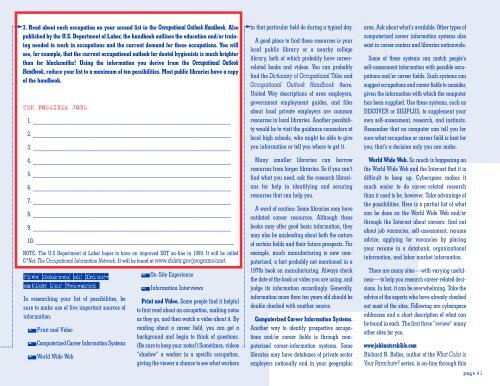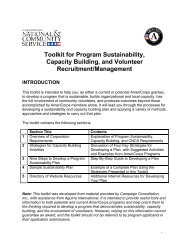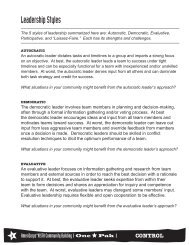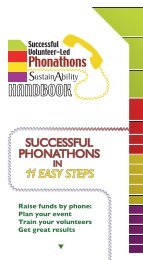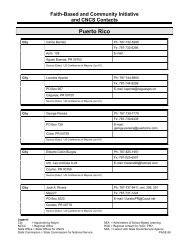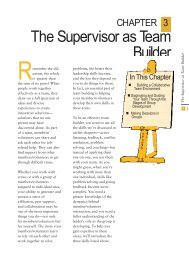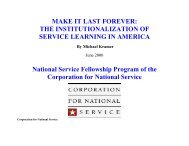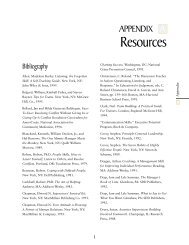Next Steps: Life After Americorps - National Service Knowledge ...
Next Steps: Life After Americorps - National Service Knowledge ...
Next Steps: Life After Americorps - National Service Knowledge ...
Create successful ePaper yourself
Turn your PDF publications into a flip-book with our unique Google optimized e-Paper software.
3. Read about each occupation on your second list in the Occupational Outlook Handbook. Also<br />
published by the U.S. Department of Labor, the handbook outlines the education and/or training<br />
needed to work in occupations and the current demand for these occupations. You will<br />
see, for example, that the current occupational outlook for dental hygienists is much brighter<br />
than for blacksmiths! Using the information you derive from the Occupational Outlook<br />
Handbook, reduce your list to a maximum of ten possibilities. Most public libraries have a copy<br />
of the handbook.<br />
TEN POSSIBLE JOBS<br />
1. _________________________________________________________<br />
2. _________________________________________________________<br />
3. _________________________________________________________<br />
4. _________________________________________________________<br />
5. _________________________________________________________<br />
6. _________________________________________________________<br />
7. _________________________________________________________<br />
8. _________________________________________________________<br />
9. _________________________________________________________<br />
10. _________________________________________________________<br />
NOTE: The U.S Department of Labor hopes to have an improved DOT on-line in 1999. It will be called<br />
O*Net: The Occupational Information Network. It will be found at www.doleta.gov/programs/onet.<br />
Five Sources of Information<br />
for Research<br />
In researching your list of possibilities, be<br />
sure to make use of five important sources of<br />
information:<br />
* Print and Video<br />
* Computerized Career Information Systems<br />
* World Wide Web<br />
* On-Site Experience<br />
* Information Interviews<br />
Print and Video. Some people find it helpful<br />
to first read about an occupation, making notes<br />
as they go, and then watch a video about it. By<br />
reading about a career field, you can get a<br />
background and begin to think of questions.<br />
(Be sure to keep your notes!) Sometimes, videos<br />
“shadow” a worker in a specific occupation,<br />
giving the viewer a chance to see what workers<br />
in that particular field do during a typical day.<br />
A good place to find these resources is your<br />
local public library or a nearby college<br />
library, both of which probably have careerrelated<br />
books and videos. You can probably<br />
find the Dictionary of Occupational Titles and<br />
Occupational Outlook Handbook there.<br />
United Way descriptions of area employers,<br />
government employment guides, and files<br />
about local private employers are common<br />
resources in local libraries. Another possibility<br />
would be to visit the guidance counselors at<br />
local high schools, who might be able to give<br />
you information or tell you where to get it.<br />
Many smaller libraries can borrow<br />
resources from larger libraries. So if you can’t<br />
find what you need, ask the research librarians<br />
for help in identifying and securing<br />
resources that can help you.<br />
A word of caution: Some libraries may have<br />
outdated career resources. Although these<br />
books may offer good basic information, they<br />
may also be misleading about both the nature<br />
of certain fields and their future prospects. For<br />
example, much manufacturing is now computerized,<br />
a fact probably not mentioned in a<br />
1970s book on manufacturing. Always check<br />
the date of the book or video you are using, and<br />
judge its information accordingly. Generally,<br />
information more than ten years old should be<br />
double checked with another source.<br />
Computerized Career Information Systems.<br />
Another way to identify prospective occupations<br />
and/or career fields is through computerized<br />
career-information systems. Some<br />
libraries may have databases of private sector<br />
employers nationally and in your geographic<br />
area. Ask about what’s available. Other types of<br />
computerized career information systems also<br />
exist in career centers and libraries nationwide.<br />
Some of these systems can match people’s<br />
self-assessment information with possible occupations<br />
and/or career fields. Such systems can<br />
suggest occupations and career fields to consider,<br />
given the information with which the computer<br />
has been supplied. Use these systems, such as<br />
DISCOVER or SIGIPLUS, to supplement your<br />
own self-assessment, research, and instincts.<br />
Remember that no computer can tell you for<br />
sure what occupation or career field is best for<br />
you; that’s a decision only you can make.<br />
World Wide Web. So much is happening on<br />
the World Wide Web and the Internet that it is<br />
difficult to keep up. Cyberspace makes it<br />
much easier to do career-related research<br />
than it used to be, however. Take advantage of<br />
the possibilities. Here is a partial list of what<br />
can be done on the World Wide Web and/or<br />
through the Internet about careers: find out<br />
about job vacancies, self-assessment, resume<br />
advice, applying for vacancies by placing<br />
your resume in a databank, organizational<br />
information, and labor market information.<br />
There are many sites—with varying usefulness—to<br />
help you research career-related decisions.<br />
In fact, it can be overwhelming. Take the<br />
advice of the experts who have already checked<br />
out most of the sites. Following are cyberspace<br />
addresses and a short description of what can<br />
be found in each. The first three “review” many<br />
other sites for you.<br />
www.jobhuntersbible.com<br />
Richard N. Bolles, author of the What Color is<br />
Your Parachute? series, is on-line through this<br />
page 41


